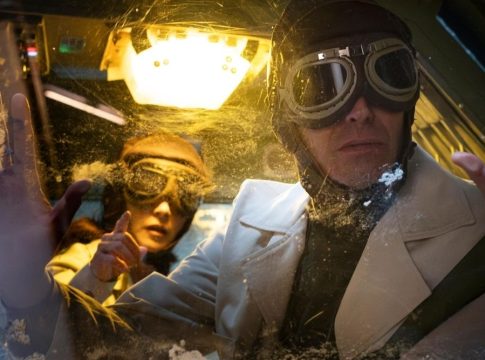Our Times (Nuestros Tiempos): A Time-Traveling Tale Gone Awry
A Promising Start in the 60s
Netflix’s Our Times (or Nuestros Tiempos, if you’re feeling fancy) kicks off with an intriguing premise that whispers "adventure" right from the get-go. Picture this: it’s the 1960s, and two brilliant scientists, Nora (played by the lovely Lucero) and Héctor (the charming Benny Ibarra), are knee-deep in the creation of a time machine. They’re head-over-heels in love and equally competent—a dream team, right? But alas, it’s a man’s world, and Nora faces an uphill battle for equality and respect in her field.
A Leap into the Future
When this dynamic duo finally manages to leap into the year 2025, their reality flips upside down. The curly-haired couple discovers a world transformed by technology—with the internet, smartphones, and new social norms. Cue the cute moments: they’re trying on modern clothes, listening to contemporary music, and even bonding with Nora’s future family. Sure, it edges into cheesy territory, but who doesn’t love a little nostalgia mixed with the charm of fish-out-of-water antics?
Where It All Goes Wrong
But hold onto your hats, folks—while the initial set-up is delightful, the plot quickly unravels into a tangled mess. Let’s talk about the glaring "how" of time travel—because honestly, it barely makes sense! Their time machine is broken right after arrival, and the duo attempts to fix it while keeping their adventure a secret. Sketchy, right?
As they navigate their new lives, things take a sharp turn into problematic territory. Nora meets her future niece and former student Julia, now a powerful figure in academia, and witnesses women standing independently—a breath of fresh air. However, for Héctor, this progression sends him spiraling into a not-so-pretty midlife crisis. Suddenly, he’s surrounded by a crowd of women-hating male colleagues, and his character transforms into a comically grotesque caricature of a 1960s misogynist.
That’s Not How Character Development Works!
Instead of celebrating Nora’s newfound independence, the focus shifts to Héctor and his petty grievances. When did Our Times decide to prioritize man-pain over woman empowerment? This character shift distracts from what could have been a rich exploration of gender dynamics and self-discovery. Instead, viewers are left rolling their eyes as Héctor throws a tantrum, all while pulling away the spotlight from Nora just when she’s blossoming.
The Bitter End
To add insult to injury, the film concludes with a jaw-dropping twist that feels more like a bad hair day than an epic finish. Instead of a satisfying resolution, the ending leaves viewers scratching their heads, pondering the lost potential of a truly captivating love story wrapped in a time-traveling bow.
In the end, Our Times serves as a reminder that even with an enthralling premise and relatable moments, a flawed story can crash and burn. If only the filmmakers had leaned into the heart of the matter instead of sidelining their strongest female character. With a stronger narrative and a little more cash behind the scenes, this could’ve been a powerhouse film rather than a mere flicker of what might have been.
Our Times (Nuestros Tiempos) is currently streaming on Netflix, and let’s just say—it’s a ride you might want to buckle up for, or just steer clear altogether.

Covers viral stories, pop culture, and breaking celebrity news.
Bio: Jamie has a sharp eye for what’s buzzing online, tracking social media trends and entertainment headlines around the clock.

